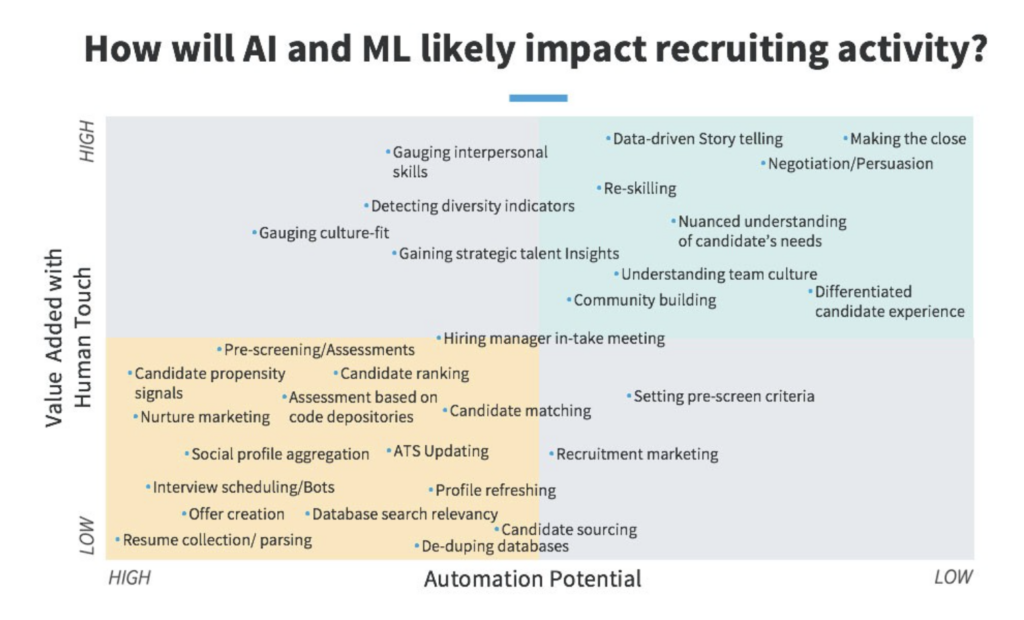AI Will Do the Admin – But Are You Ready for the Real Work?
Let’s flip the script for a second. We’ve been talking a lot about how recruiters can get better at using AI tools. It makes sense, right? AI is the shiny new toy everyone’s playing with, and recruiters have a big onus to get comfortable with this technology.
But are we somewhat missing a bigger picture here?
Very soon, the real question isn’t going to be how recruiters can use AI better – instead, it will focus on whether we’re preparing them for a future where AI is doing most of the heavy lifting.
Are we cultivating recruiters with the skills needed to be successful in this AI-powered era?
What Happens When the Robots Take Over?
Let’s be honest – recruiters are buried under a mountain of admin work. Market research, preparing reports, drafting job descriptions, scheduling interviews, updating CRMs… it’s endless!
According to James Osborne, who I listened to speak at an event recently, roughly 80% of a recruiter’s time goes into this admin work. That leaves just 20% for the good bits: strategy meetings, candidate calls, and (hopefully) a little bit of professional development.
But here’s the twist: AI is about to invert that ratio. Instead of drowning in menial work, recruiters will soon spend just 20% of their time setting up automations, reviewing outputs, and giving the final thumbs up. The other 80%? That’s for the fun stuff – building relationships, consulting, and actually making an impact on the business.
The Real Problem (Hint: It’s Not AI)
Here’s what worries me: most recruiters are skilling up on how to use AI tools (which they should be), but they’re not preparing for the part where they have to actually do more human and strategic work. The part where they build relationships, influence stakeholders, and really understand the business.
Think about it. If AI is doing all the heavy lifting, what’s left for recruiters to master? Here is what I believe to be the skill set:
- Business Partnering and Commercial Fluency: Understanding how businesses actually work. It’s more than knowing your own company; it’s about understanding the whole landscape – how companies make money, how departments interact, and how to talk strategy with hiring managers.
- Influencing and Stakeholder Management: With more time freed up, recruiters will be spending a lot more of it talking to people. Building relationships. Managing expectations. Guiding decision-making. These are the skills that will set them apart.
- Data Fluency: AI will give you data, but it won’t tell the story. Recruiters will need to interpret that data, draw insights, and influence decisions based on what they find. Think of it as being the translator between what the numbers say and what the business needs to hear.
- Branding and Storytelling: AI can’t tell a great story (yet!). Whether it’s communicating with candidates or selling your employer brand internally, recruiters will need to craft narratives that resonate.
- Digital Fluency and AI Awareness: You still need to know how the tools work – but more importantly, you need to understand how to make them work for you without losing the human element. After all, nobody wants to feel like they’re talking to a bot.
What’s mind-blowing about this, however, is that there’s nothing new here! When I was researching for a talk a few weeks ago I found this chart, first published on LinkedIn in 2017, that predicts this very scenario.

Brace Yourself Because it Won’t Be a Slow Burn
This shift isn’t going to happen gradually. The future has been in motion for years – we’re beyond the point of speculation now. All it will take is for a new tool to land on your desk, and suddenly, your workload will flip in a matter of days. You could go from managing 40 reqs to overseeing 400 in the blink of an eye.
And it’ll be the recruiters who have built these strategic skills who will thrive in this reality. Those who haven’t will be stuck wondering what just happened.
Reports are beginning to flood in on how much time a recruiter will save by automating recruiting tasks with AI. The people who are ready – who have already built those human-centric skills – will be the ones still standing when the dust settles.
Growth Mindset Required
It’s not just about being good at what you do now. It’s about being ready to level up. Employers are going to be looking for recruiters who aren’t scared of change – the ones who put their hands up and say, “I’ve got this. I understand this.”
Don’t hesitate. Start building these skills now. Get comfortable with both the tech and the human side. Look for practical training – not just watching videos, but actively practicing these skills. Use AI to build these muscles too – whether it’s conducting mock interviews or practicing pitch scenarios. SocialTalent has been developing exactly this, providing AI-driven activities to help recruiters build these skills.
The future belongs to those who don’t just keep up with AI, but who see beyond it and build the skills that will always matter.
This article originally appeared in Johnny Campbell’s Talent Leadership Insights LinkedIn newsletter. Click here to subscribe!

